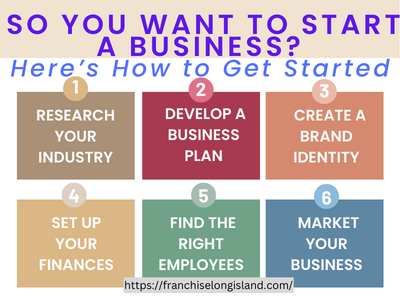Starting a business can be an extremely rewarding experience, but it can also be quite challenging. There are a lot of steps involved in starting a business, and if you’re not prepared for them, you could easily find yourself overwhelmed. In this blog post, we will outline the steps that you need to take to start your own business. We will also provide tips on how to make the process as smooth as possible. So if you’re ready to start your own business, read on!
Steps on how to start a business
Your business journey begins with a great idea.
When starting a business, it’s important to come up with an idea that is both innovative and viable. This might mean looking for gaps in the market or thinking of ways to improve existing products or services. Once you’ve brainstormed some potential ideas, do your research to determine which ones are most viable.
How to create a business idea?
There are a few key steps that you can take to create a business idea that is both innovative and viable. These steps may include:
1. Brainstorming potential ideas for your business. This could involve looking for gaps in the market, thinking about ways to improve existing products or services, or simply coming up with new, innovative ideas.
2. Conducting research to analyze the feasibility of your business idea. This might involve surveying potential customers or talking to industry experts to understand the needs of your target market and whether there is room in the marketplace for your product or service.
3. Creating a detailed business plan that outlines how you plan to bring your idea to life and how you will make it profitable over time. This
Research your idea and industry.
One of the most important steps in starting a business is getting to know your industry. This involves researching things like market size, competition, and trends. You should also research legal and financial requirements for starting a business in your area. Your research will help you come up with a solid business plan that outlines how you plan to run and grow your business.
Business research best practices.
When starting a business, some of the key steps for conducting research include:
– Conducting market research to understand your target customers and their needs. This could involve surveying potential customers, analyzing industry trends, or interviewing experts in your field.
– Researching legal and financial requirements for starting a business in your area. This will help ensure that you are well prepared before starting your business.
– Analyzing competitors in your industry to learn more about their products, services, and target markets. This can help you develop strategies to differentiate yourself from other businesses in your space and create an effective marketing plan.
Once you’ve completed your research and developed a solid business plan, it’s time to take the next step – starting your business!
Develop your business plan.
Your business plan is essentially your roadmap for starting and growing your business. It should include things like goals, milestones, budgeting needs, marketing strategies, and any other information that is relevant to running your business successfully. Creating a detailed business plan can seem overwhelming at first, but it’s well worth the effort! Once you have a solid plan in place, you’ll be able to move forward with confidence and make smart decisions as your business grows.
Best business plan template.
There are a variety of business plan templates available online that can help you get started. Some of the key elements to include in your business plan template may include:
– A description of your business and its products or services
– A detailed marketing plan, outlining strategies for reaching your target customers and growing sales over time
– Financial projections and budgeting needs, including funding requirements, starting costs, and ongoing expenses
– Milestones and goals for starting and growing your business over time
If you’re looking for a high-quality business plan template that will help guide you through starting a new business, there are many options available online. Simply do some searching to find the right one for your needs!
Once you have everything in place, it’s time to tackle the next and very important step…finance.

Set up your finances.
In addition to developing a business plan, you’ll also need to set up your finances. This can include things like choosing a business structure, opening business bank accounts, applying for permits and licenses, and making decisions about incorporating or starting as a sole proprietorship. It’s important to do this early on so that you have all the legal and financial requirements in place before starting your business operations.
Setting up your business finances do’s and don’t.
When starting a business, there are a few key things to keep in mind when setting up your finances. These include:
– Choosing the right business structure – This is an important first step that can impact everything from taxes and liability to insurance needs. Your choice will depend on factors like your industry, startup costs, and long-term goals for your business.
– Applying for permits and licenses – Depending on the type of business you are starting, you may need to apply for various state or local permits and licenses. It’s important to do this early on so that you can start operating legally as soon as possible.
– Opening business bank accounts – Having separate bank accounts for your business is essential for keeping track of income and expenses and keeping your business finances organized.
– Incorporating or starting as a sole proprietorship – Making the decision about whether to incorporate or start as a sole proprietorship can depend on a variety of factors, such as the legal requirements in your area, the number of employees you have, and your long-term goals for your business. Though there are many different considerations to take into account, it’s important to weigh these carefully so that you make the right choice for your unique business needs.
Where to get funding…if you need one.
When starting a business, securing adequate funding is often one of the biggest challenges that entrepreneurs face. There are many different options available, including grants, crowdfunding platforms, bank loans and more. Before starting your search for funding, it’s important to do some research to figure out which type will best suit your needs.
Some key factors to consider when looking for business funding include:
– Your starting capital requirements – How much money do you need to get started? Will you be able to cover these costs on your own, or will you need additional funding?
– Your projected growth timeline – Do you plan on growing quickly or gradually over time? Will this require additional funds as your business grows?
– Your industry and location – Different funding options may be more or less accessible depending on the industry and location of your business. For example, if you are starting a tech startup in Silicon Valley, you may have access to a wider range of funding sources than if you were starting an e-commerce business in a smaller rural town.
Ultimately, the key is to do your research, assess your needs carefully, and choose the right funding option for starting and growing your business over time. With some planning and persistence, it’s possible to find the resources that you need to make your entrepreneurial dreams a reality!
Build a strong team.
To successfully start a business, it’s also important to build a good team of advisors and employees. This might include hiring professionals like an accountant or lawyer, or partnering with other business owners in your industry for support and guidance. The people on your team should have the skills and experience needed to help you achieve your goals, so think carefully about who you want on your team before making any big decisions.
Thinks to think about when building a team for your business.
When starting a business, one of the most important decisions you will need to make is who to bring on as part of your team. There are many different factors to consider when building your team, including:
– Your industry and location – The type of industry you are starting a business in, as well as where it’s located, may influence the types of people that are available for hire. For example, if you plan on starting an e-commerce business from home, it may be more challenging to find talent compared to starting a larger company in a major city or tech hub.
– Your long-term goals – How quickly do you plan on growing your business? What role do you envision each member playing in achieving those goals?
– Your starting capital requirements – Do you have the funds available to hire employees, or will you need to seek out funding options?
When building your team, it’s important to identify and consider these factors as you make decisions about who to bring on board. With the right combination of talent and experience, it’s possible to create a strong foundation for success in starting your business.
Market your business.
Once your business is off the ground, you’ll need to focus on marketing and promoting it. This might include things like creating a website and social media pages, running ads or promotions, or reaching out to potential customers in person. Marketing your business effectively will be key to its success, so make sure that you have a solid plan in place for getting the word out about what you have to offer.
How to market a business.
There are many different strategies for marketing a business effectively. Some key steps to consider include:
– Creating a website and social media pages – Having an online presence is essential for most businesses, as it allows you to reach potential customers more easily and stay in touch with existing customers.
– Running ads or promotions – Whether you choose to promote your business through paid ads on social media, billboards, or other platforms, this can be an effective way to get the word out about what you have to offer.
– Reaching out to potential customers – Another important strategy is reaching out directly to potential customers through things like email marketing campaigns, networking events, or cold calling/door-knocking efforts.
When starting a business, it’s important to be strategic and creative when marketing your company. By using a combination of different tactics, you can connect with potential customers and build a strong base of support for your business that will help drive long-term success.
Starting a business can be an exciting and rewarding experience. Just remember that it’s important to do plenty of planning and preparation beforehand to ensure that your business gets off on the right foot. Good luck as you embark on this new chapter of your life!

